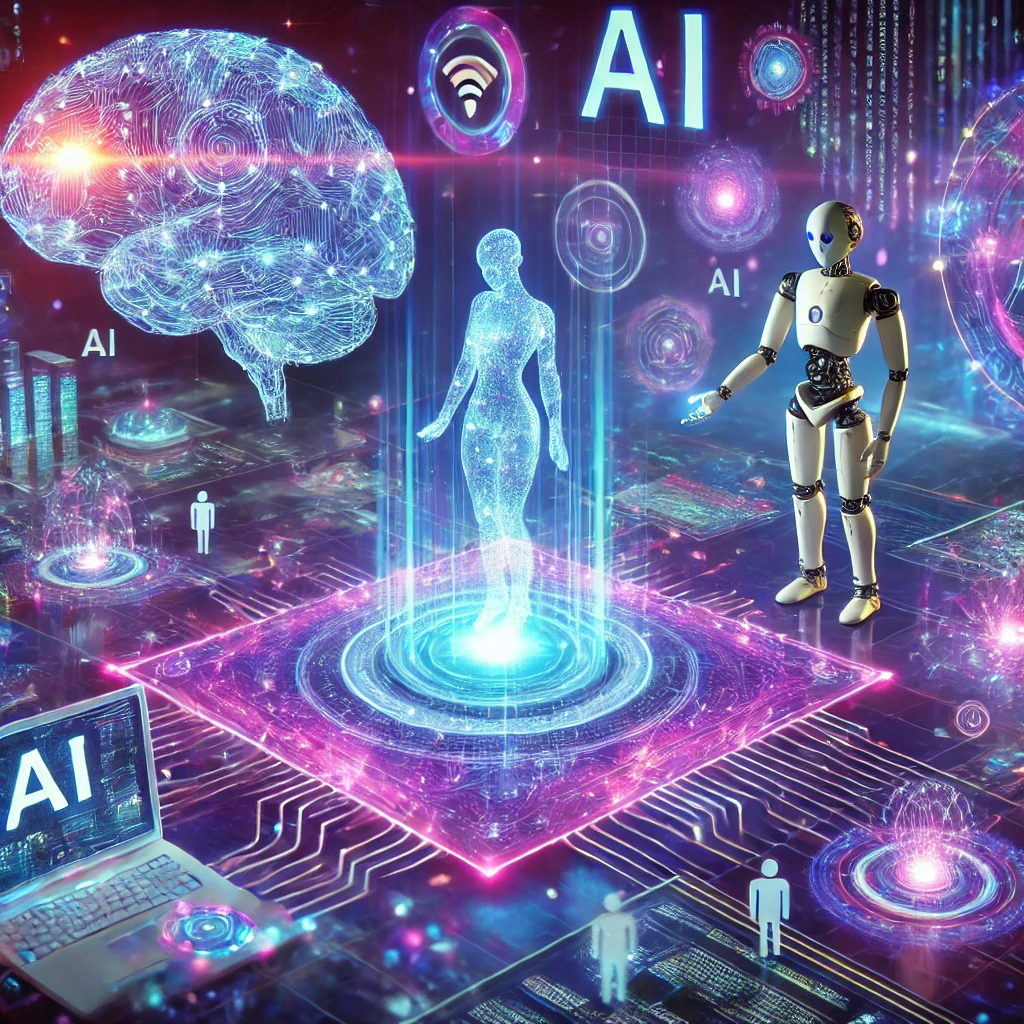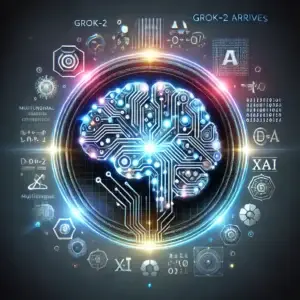Introduction to Artificial Intelligence
Artificial Intelligence (AI) refers to the capability of machines to perform tasks that typically require human intelligence. This encompasses a range of processes, including learning, reasoning, problem-solving, perception, language understanding, and even creativity. The history of AI dates back to the mid-20th century, where early projects were focused on basic algorithms that mimicked human reasoning. These initial attempts laid the groundwork for the development of more advanced technologies.
The journey of artificial intelligence can be divided into several distinct phases. In the early years, researchers developed systems that were rule-based, relying heavily on predefined instructions and logical reasoning. As computational power increased, so did the complexity of AI systems. The introduction of machine learning marked a significant advancement, allowing computers to learn from data and improve their performance over time without explicit programming.
In recent years, the resurgence of AI has been driven by breakthroughs in deep learning, which employs neural networks to analyze and interpret vast amounts of unstructured data. These advancements have enabled AI applications in diverse fields such as healthcare, finance, autonomous vehicles, and natural language processing. Furthermore, the accessibility of large datasets and increased computational resources has accelerated innovation, solidifying AI as a central topic of discussion in technology today.
Organizations across various sectors are recognizing the potential of AI for enhancing efficiency and informing decision-making. As a result, investment and research continue to flourish, pushing the boundaries of what artificial intelligence can achieve. This rapid rise in AI’s influence highlights not only its transformative capabilities but also the ethical and societal challenges that accompany its adoption. Understanding the evolution and significance of AI is crucial for navigating its implications in our modern world.
Current Trends in AI Technology
The field of artificial intelligence (AI) is witnessing an unprecedented transformation, driven by significant advancements in several key areas. Machine learning, natural language processing (NLP), and computer vision are at the forefront of these developments, continually reshaping the technological landscape and enhancing various applications across industries.
In machine learning, algorithms are becoming more sophisticated and efficient, allowing for the analysis of large data sets with greater accuracy. This progress has enabled businesses to make data-driven decisions faster than ever before. Techniques such as deep learning have shown remarkable success in tasks like speech recognition and image classification, providing powerful tools for organizations to harness the potential of their data.
Natural language processing has also made significant strides, as AI systems become increasingly adept at understanding and generating human language. The emergence of advanced chatbots and virtual assistants is a prime example of how NLP is being applied in customer service, enabling businesses to provide instant support and improve user experience. Additionally, sentiment analysis tools are helping companies gauge public opinion and customer feedback in real time, aiding in strategic planning.
Computer vision technology is another area witnessing rapid growth, with AI systems capable of interpreting and processing visual information. Innovations in facial recognition, object detection, and image segmentation have diverse applications, ranging from security to healthcare. For example, AI-powered imaging tools are significantly enhancing diagnostics in medical fields, allowing for earlier detection of conditions and improving patient outcomes.
These trends in AI technology are not only enhancing efficiency and productivity but are also transforming how industries operate. As breakthroughs continue to surface, the possibilities for leveraging AI are nearly limitless, indicating a future where these technologies will be integral to everyday life.
AI in Business and Industry
The integration of artificial intelligence (AI) into various sectors has seen a significant surge, as businesses recognize its potential to enhance operations, streamline processes, and ultimately improve customer satisfaction. Companies across diverse industries, including finance, healthcare, and manufacturing, are increasingly adopting AI technologies to remain competitive in a rapidly evolving market.
In the finance sector, financial institutions are utilizing AI applications for fraud detection, risk assessment, and personalized customer service. Machine learning algorithms analyze vast amounts of transactional data to identify unusual patterns indicative of fraudulent activities. Furthermore, AI-driven chatbots can address Customer inquiries 24/7, providing timely support and improving customer engagement. Major banks and insurance firms have also implemented AI to tailor financial products to individual client needs, optimizing their service offerings.
Healthcare is another area where AI shows promising advancements. Hospitals and clinics employ AI algorithms for diagnostic processes, predictive analytics, and treatment recommendations. For instance, AI-powered imaging tools assist radiologists in detecting conditions such as tumors or fractures more accurately. Additionally, AI applications are enhancing patient care through remote monitoring systems that utilize data analytics to track patients’ health in real-time, enabling timely interventions.
In the manufacturing industry, AI is revolutionizing production lines by introducing automation and predictive maintenance. Smart factories leverage AI-driven machinery to optimize manufacturing processes, reduce downtimes, and minimize waste through improved resource management. With the rise of the Internet of Things (IoT), manufacturers are employing AI to analyze performance data from machinery, facilitating maintenance before breakdowns occur and thereby enhancing overall efficiency.
As artificial intelligence continues to evolve, its ability to reshape business practices is becoming increasingly evident. The successful implementation of AI across various sectors demonstrates a clear trend towards a future where AI plays a critical role in driving innovative solutions for business challenges.
Ethical Considerations and Challenges
The rapid advancement of artificial intelligence (AI) technologies has ushered in a host of ethical dilemmas that necessitate scholarly and public discourse. Among the foremost concerns is data privacy. As AI systems often require vast amounts of personal data to function effectively, the potential for misuse or unauthorized access to sensitive information is significant. The continuous collection and analysis of personal data raise questions about informed consent and the extent to which individuals are aware of how their information is utilized. The challenge lies in developing AI frameworks that not only leverage data for improved functionality but also protect user rights and privacy.
Another pressing ethical challenge is job displacement. As AI systems become more proficient in performing tasks traditionally conducted by humans, the labor market faces substantial shifts. This trend raises ethical questions about the responsibility of corporations and governments to prepare the workforce for such transitions. Questions surrounding retraining, reskilling, and potential unemployment necessitate a thorough evaluation of how to incorporate AI technologies without jeopardizing the livelihoods of many individuals. The conversation requires a balance between technological advancement and societal welfare.
Furthermore, the issue of algorithmic bias has sparked considerable debate within the realm of responsible AI. Algorithms, while often deemed impartial, can perpetuate or even exacerbate existing biases present in the training data. This phenomenon can lead to unjust outcomes in critical areas such as hiring practices, criminal justice, and lending. Addressing these biases is not just a technical challenge but also a moral imperative that demands collaboration among data scientists, ethicists, and lawmakers to develop equitable AI systems.
As stakeholders increasingly recognize the importance of ethical considerations in AI, it becomes essential to establish comprehensive frameworks that ensure responsible development and deployment. The ongoing dialogue around these ethical dilemmas emphasizes the need for proactive measures to navigate the complex landscape that AI technologies create.
AI in Everyday Life
The integration of artificial intelligence (AI) into everyday life has become increasingly prevalent, significantly transforming how we interact with technology. Smart home devices, such as thermostats, lights, and security systems, utilize AI algorithms to learn user preferences and automate routine tasks. For instance, smart thermostats can adjust heating or cooling settings based on patterns in user behavior, leading to greater energy efficiency and comfort. These advancements not only enhance convenience but also contribute to resource savings in the long run.
Moreover, virtual assistants like Amazon’s Alexa, Google Assistant, and Apple’s Siri have become household staples, facilitating an array of tasks—from managing calendars to controlling home appliances. These AI-driven tools streamline daily activities through voice commands and natural language processing, allowing consumers to manage their lives more effectively. Users benefit from enhanced accessibility and increased efficiency, with AI-enabled virtual assistants capable of providing personalized information and support.
Furthermore, the integration of AI in personalized content recommendations has revolutionized how individuals engage with digital platforms. Streaming services and social media platforms leverage AI to analyze user behaviors and preferences, ultimately curating tailored content suggestions. This personalization enhances user experience and engagement, combating information overload by filtering out less relevant content. However, this personalized approach may raise concerns regarding data privacy and the potential for echo chambers, where users are only exposed to content that reinforces their existing beliefs.
In summary, the rapid rise of AI has introduced numerous benefits to everyday life, enhancing convenience, efficiency, and personalization in consumer technology. While the positive implications of AI integration are noteworthy, awareness of potential drawbacks is essential for making informed decisions about their use in various aspects of daily living.
AI in Research and Development
Artificial Intelligence (AI) is increasingly becoming a cornerstone in the field of research and development (R&D), offering unprecedented advantages across a diverse array of disciplines. One of the most notable applications of AI is in drug discovery, where machine learning algorithms expedite the identification of potential therapeutic compounds. Traditional methods of drug development often require extensive time and financial resources. However, AI can analyze vast datasets to predict drug interactions and efficacy, significantly reducing the period required to bring new medications to market.
In addition to pharmaceuticals, AI plays a crucial role in climate modeling and environmental research. By employing sophisticated data analysis techniques, AI helps researchers to process complex climate data and simulate various scenarios, improving the accuracy of climate predictions. This ability to derive insights from extensive datasets is essential in addressing pressing global issues such as climate change and resource management. AI-driven models allow scientists to make data-informed decisions that can guide policy and conservation efforts.
Moreover, AI is revolutionizing the field of robotics, with applications ranging from autonomous vehicles to industrial robots. The integration of AI in robotics enhances the ability of machines to learn from their environments, adapt to new tasks, and collaborate with human counterparts effectively. This synergy not only boosts productivity but also opens up new avenues for innovation in automation and intelligent systems.
AI’s transformative potential in research and development is evident across multiple sectors, providing researchers with tools that enhance their capabilities and broaden their horizons. By facilitating quicker data processing and fostering innovation, AI serves as a catalyst for scientific discovery. The ongoing evolution of AI technologies promises to further enrich the realm of R&D, unlocking new possibilities and accelerating the pace of advancements in various scientific fields.
Global AI Initiatives and Collaborations
The advancement of artificial intelligence (AI) relies heavily on collaborative efforts across borders and sectors. Several global initiatives have emerged, intertwining the capabilities of governments, academic institutions, and industries to foster AI research and development. These partnerships play a critical role in shaping a robust ecosystem conducive to innovation and technological advancement. For instance, the Global Partnership on AI (GPAI) has been established to promote collaboration among countries while addressing global challenges posed by AI. This initiative focuses on responsible AI utilization, ensuring that technology aligns with human rights and ethical frameworks.
Moreover, the European Union has launched various programs aimed at boosting AI research through funding and strategic partnerships. By investing in AI research, they are not only fostering innovation within member states but are also positioning Europe as a leader in this domain. Collaboration with tech companies and academic institutions further strengthens their initiatives, creating a symbiotic relationship that facilitates knowledge sharing and resource distribution.
Universities also play a pivotal role in AI advancements through research initiatives and interdisciplinary projects. Many institutions have partnered with industry leaders to work on real-world applications of AI, ranging from healthcare to environmental sustainability. These academic-industry collaborations are instrumental in translating theoretical research into practical solutions, enhancing the overall impact of AI technologies on society.
Furthermore, countries like the United States and China are heavily investing in national AI strategies that prioritize international cooperation. This approach aims to share expertise and resources, ultimately driving forward the global agenda on AI development. In summary, the collective effort of governments, universities, and industries globally is vital in ensuring the responsible advancement of AI technologies, promising a future where AI can be harnessed for the greater good.
Future of AI: Predictions and Trends
The field of artificial intelligence (AI) is evolving at an unprecedented pace, and its future holds numerous exciting possibilities. As we look ahead to the next decade, several key trends and predictions are emerging that suggest significant developments in AI technologies and their societal implications.
One major trend is the continued enhancement of machine learning algorithms. These algorithms are becoming more sophisticated, enabling AI systems to process vast amounts of data with remarkable accuracy. As a result, we can anticipate breakthroughs in areas such as natural language processing, computer vision, and robotics. This advancement will likely lead to more intuitive human-AI interactions, allowing for seamless integration into everyday life.
Moreover, the rise of explainable AI is expected to be a significant focus in the coming years. As AI technologies become omnipresent, the demand for transparency in decision-making processes will grow. Researchers are likely to invest efforts in developing models that not only provide predictions but also elucidate their rationale. This development will foster trust and understanding among users, leading to broader acceptance and application of AI solutions.
Additionally, AI’s impact on various industries is predicted to transform job landscapes. Automation may replace certain roles, but it will also create new opportunities in AI management, ethics, and development. As companies increasingly rely on AI systems, a skilled workforce adept in these technologies will become essential, prompting a shift in educational strategies and workforce training programs.
Lastly, ethical considerations surrounding AI development remain paramount. The dialogue on responsible AI usage will likely intensify as technologies evolve. It is anticipated that regulations and guidelines will emerge, governing AI’s impact on privacy, security, and bias, thereby promoting its responsible use in society.
Conclusion: Embracing the AI Revolution
The emergence of artificial intelligence (AI) has undeniably transformed various sectors, impacting how businesses operate and individuals engage with technology. This blog post has explored the current trends in AI, highlighting its growing influence on automation, data analysis, and customer interaction. From machine learning advancements to natural language processing, the capabilities of AI are expanding rapidly, demanding that both organizations and individuals stay informed about developments in this field.
As AI systems become more integrated into daily operations, understanding their functions and implications will be crucial. Responsibly harnessing AI technology not only enhances productivity but also fosters innovation across industries. The importance of ethical considerations surrounding AI cannot be overstated, as these tools can significantly affect job markets and societal dynamics. Therefore, it is vital for stakeholders to remain vigilant, ensuring that AI’s deployment aligns with societal values and enhances human potential.
In light of these transformations, readers are encouraged to engage thoughtfully with the ongoing evolution of AI. Awareness of the latest trends and advancements can facilitate informed decisions, whether in personal use or professional implementation. Being proactive in learning about AI developments will empower individuals and organizations to adapt and thrive in an increasingly automated world. In an era characterized by rapid technological change, those who embrace and understand the AI revolution will not only be better equipped to leverage its benefits but will also play a pivotal role in shaping its future. Therefore, cultivating a mindset of adaptability and continuous learning is essential as we navigate the complexities of this new landscape.
https://www.sciencedaily.com/news/computers_math/artificial_intelligence/?utm_source=chatgpt.com




